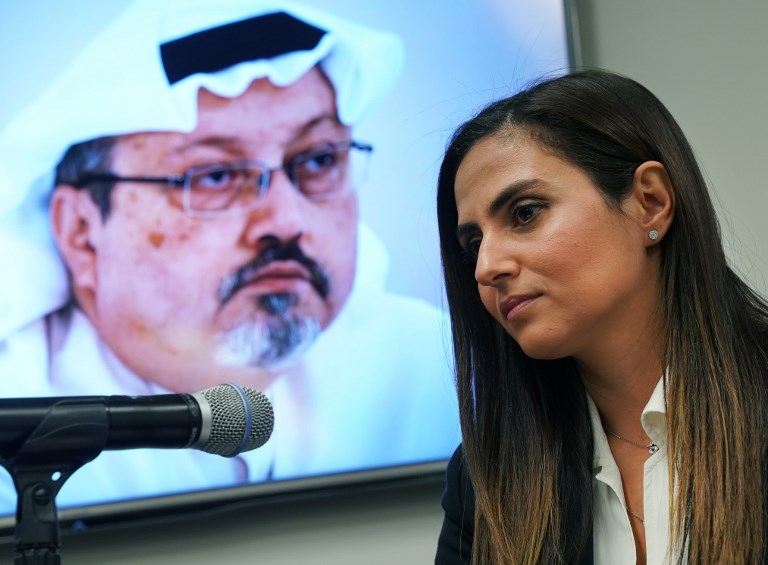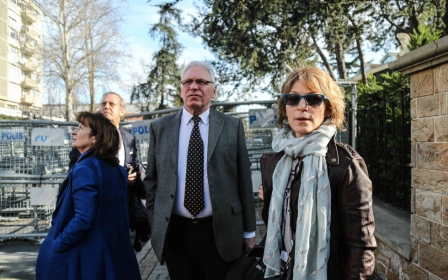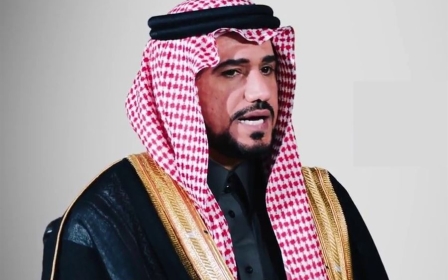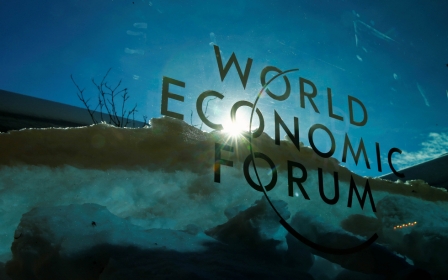UN Khashoggi probe may spark criminal complaint, analysts say

A United Nations probe into the death of Jamal Khashoggi will not immediately land any of the Saudi journalist’s killers behind bars, but it may kickstart a process that could lead to sanctions and international criminal prosecution, legal experts told Middle East Eye.
The first independent probe into Khashoggi’s death began this week with the arrival of a three-person UN team in Turkey. The probe comes more than three months after Khashoggi, a prominent Saudi-government critic and MEE columnist, was murdered and dismembered inside the Saudi consulate in Istanbul.
While high-ranking Saudis are largely shielded thanks to the oil exporter’s funding ties with the United States and Britain, the UN inquiry may yet prove irksome and even dangerous for those behind the assassination, analysts told MEE.
The UN probe, led by the Agnes Callamard, the UN’s special rapporteur on extrajudicial executions, may be one of the building blocks that ultimately lands Khashoggi’s killers in court, said Richard Dicker, an international human rights lawyer.
“Callamard’s inquiry is not a criminal investigation, it’s a fact-finding mission, and its standards for the burden of proof are different. But, if her report is passed to a criminal prosecutor, it could be very helpful in developing evidence for a criminal complaint,” Dicker told MEE.
Callamard, the UN’s special rapporteur on extrajudicial executions, touched down in Turkey on Monday to begin the week-long mission.
She will evaluate the circumstances of the crime and the “nature and the extent of states’ and individuals’ responsibilities for the killing” and report back to the Geneva-based UN Human Rights Council (HRC) in June, she told Reuters earlier this week.
The special rapporteur was joined by Helena Kennedy, a top British lawyer and a Member of the House of Lords, and Duarte Nuno Vieira, an expert in pathology and forensic science and professor at the University of Coimbra in Portugal.
Since her arrival, Callamard has met Foreign Minister Mevlut Cavusoglu and Turkish prosecutors. On Tuesday, she told reporters she had asked Saudi Arabia for access to the consulate and to meet Saudi officials but was awaiting a response.
MEE does not know whether Callamard has heard the audio recordings of Khashoggi's death that are in Turkey’s possession, which have been shared with CIA director Gina Haspel as well as officials in Germany, France and Britain.
The tapes reportedly include the killing itself and prominently feature Saud al-Qahtani, a top aide to Saudi’s de facto ruler Crown Prince Mohammed bin Salman. Other recordings, pre-dating the killing, led Ankara to conclude early on that the murder was premeditated, despite Riyadh’s denials.
The tapes and other evidence led the CIA to conclude with high confidence that bin Salman ordered Khashoggi's assassination. Turkish sources have implicated al-Qahtani with running the operation from the prince’s office, and deputy intelligence chief Ahmed al-Assiri of signing off on the killing.
The best-case scenario is she comes back with a hard-hitting report that names names — who did it and who ordered it
-Louis Charbonneau, the UN director for Human Rights Watch (HRW)
Saudi officials have repeatedly denied bin Salman’s involvement and described a "rogue operation" carried out without his knowledge. Assiri and Qahtani have since been removed from their positions, and 11 unidentified defendants have been put on trial for the crime in a Saudi court.
But the international community has questioned the credibility of Riyadh's prosecution and some have speculated that those indicted are such high-level figures that they could only have been working for bin Salman, also known as MbS.
Louis Charbonneau, the UN director for Human Rights Watch (HRW), said Callamard’s report could put the UN stamp on these theories and media reports, and force action from weightier UN organs, like the General Assembly and Security Council.
“The best-case scenario is she comes back with a hard-hitting report that names names — who did it and who ordered it. It would be useful to have recommendations for holding those responsible to account.” Charbonneau told MEE.
In the past, the top tiers of the UN system have launched probes into the assassinations of Pakistani Prime Minister Benazir Bhutto and her Lebanese counterpart, Rafik Hariri. The Security Council is empowered to refer cases to the International Criminal Court.
“UN member states should be demanding accountability, individual sanctions, prosecutions — real prosecutions instead of sham trials intended to cover up the involvement of senior Saudi leaders," added Charbonneau.
Beyond the UN system, Callamard’s evidence could underpin a case in a country with universal jurisdiction laws that allow prosecutors in Australia, Germany, Sweden and elsewhere to try crimes committed overseas, said Dicker.
HRW tried this manoeuvre, asking Argentina to use a war crimes clause in its constitution to probe bin Salman’s role in the killing, though it did not deter the royal from attending the G20 summit in Buenos Aires in November.
Bringing the UN’s strength and will into question
Others pointed to weaknesses of the probe. UN rapporteurs cannot issue subpoenas or force countries to comply, and they operate independently from the rest of the UN system. Callamard is largely dependent on Ankara, the CIA and others sharing their evidence.
UN rapporteurs are also open to claims of bias. In November, a scathing report on Britain’s “punitive, mean-spirited” anti-austerity drive by UN poverty rapporteur Philip Alston was quickly denounced by government politicians for its “extraordinarily political” language.
Analysts also cast doubt on the willingness of the international community to see through a criminal complaint against the Saudis given their oil wealth, multi-billion dollar arms purchases and lead role among Arab states.
“These investigations aren’t criminal investigations but reports into what has happened. We need the political will to take up the recommendations of these reports,” Sherine Tadros, who heads Amnesty International’s UN office, told MEE.
“They are not an end, they are a means to an end.”
UN ambassadors expressed hesitation in advancing the inquiry this week. France’s UN ambassador, Francois Delattre, told MEE the issue was “very sensitive” and that it was “too early to say” how Paris would respond.
There is no substitute for a full investigation carried out by the secretary-general of the UN
-Sherine Tadros, head of Amnesty International’s UN office
Stefan Dujarric, the spokesman for UN chief Antonio Guterres, described his support for the inquiry while also distancing his boss from Callamard, saying she “operates under a very independent mandate of the secretary-general”.
Though several high-profile American politicians have demanded that bin Salman is held responsible and have drafted laws against Riyadh’s war in Yemen, US President Donald Trump’s administration has steadfastly backed the Saudi royal.
Against this backdrop, Tadros said it will come down to Guterres taking a principled stand.
“There is no substitute for a full investigation carried out by the secretary-general of the UN,” Tadros told MEE.
“We’re dealing with Saudi Arabia, a very powerful country, and we need the force of the secretary-general behind this if we’re going to establish the facts and lead to any kind of justice.”
New MEE newsletter: Jerusalem Dispatch
Sign up to get the latest insights and analysis on Israel-Palestine, alongside Turkey Unpacked and other MEE newsletters
Middle East Eye delivers independent and unrivalled coverage and analysis of the Middle East, North Africa and beyond. To learn more about republishing this content and the associated fees, please fill out this form. More about MEE can be found here.




